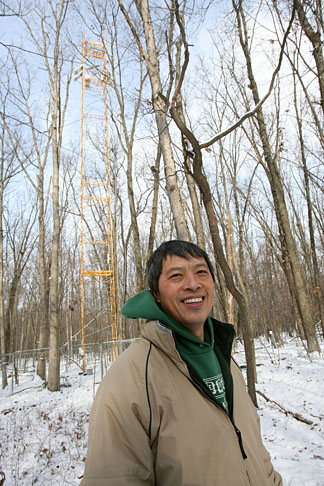
Dr. Jiquan Chen stood in front of the flux tower at Oak Openings Metropark in this photo taken in January. He provided measurements from this and other towers to the study recently published in Nature that presented a global view of evapotranspiration from 1982 to 2008.
Dr. Jiquan Chen, UT professor of environmental sciences, and a team of other scientists were able to do so in a data-driven study recently published in Nature called “Recent Decline in the Global Land Evapotranspiration Trend Due to Limited Moisture Supply.”
Evapotranspiration, also known as ET, is the combination of evaporation of surface water and plant transpiration back into the atmosphere. Until recently, it was measured with a formula that essentially assessed other factors; evapotranspiration was configured with the information left unaccounted for.
This latest study, which gained attention in Nature, gathered data from 253 flux towers that directly measure ET and compiled it for a global view of evapotranspiration from 1982 to 2008.
“This paper really targeted how global warming may have happened in the past in order to help in the future,” Chen said. “The amount of evapotranspiration gives us information on the water movement from plants and soil back to the atmosphere, which in addition to temperature and other factors, can help us look at a global scale what has happened and predict what will happen in the future. We know less about water than we do about temperature or carbon.”
The study found that from 1982 to 1997 there was a large amount of water loss through evapotranspiration, to the tune of seven tons a decade.
Interestingly, though, the water loss nearly ceased from then through 2008, which was the end of the study’s time period. That is believed to be because after the last major El Niño event in 1998, there was less moisture, particularly in areas, including Africa and Australia. If there is less moisture, there will be less movement of that moisture through evapotranspiration.
Chen provided a large amount of the data to the study because of the number of flux towers he uses in his research. There is a tower at Oak Openings Metropark, and he collects data from towers in Wisconsin, North Carolina, Michigan, Washington and China.
The collaborative approach of this study that compiled the data of a number of researchers is the future of science, Chen said.
“We’ll see this as the direction of science, bringing people together,” Chen said. “Issues like this, climate change, are beyond an individual lab effort, and require people to put in the time and to volunteer their data and ideas to really have an impact.”
Chen, who joined the UT faculty in 2001 and was named a University Distinguished Professor in April, already was known internationally for his research linking biophysical measurements to important ecosystem processes underlying climate change and environmental disturbances.
His involvement in this study likely will increase the requests for his collaboration.